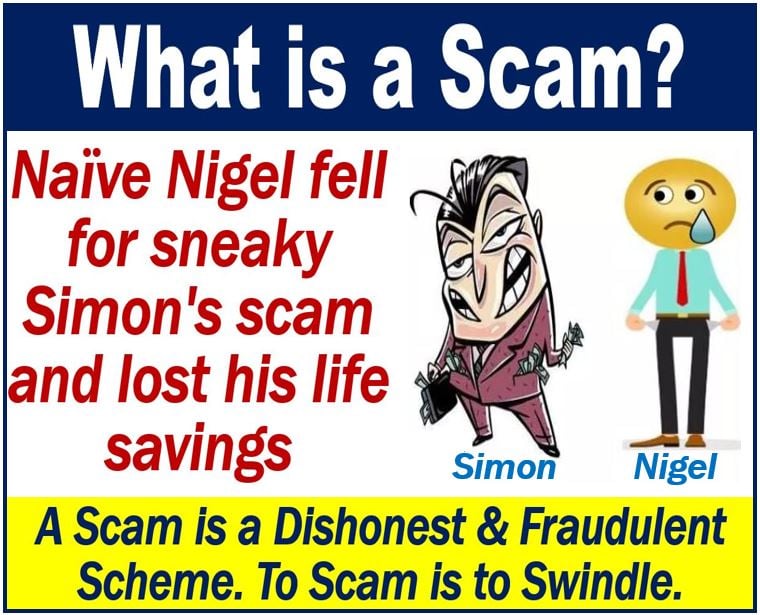A Scam is a dishonest or fraudulent scheme that attempts to take money or something of value from people. It is a confidence trick that dishonest groups, individuals, or companies perform. The person who carries out a scam is a scammer, trickster, or swindler.
A scammer may, for example, present somebody with false information during an offer or deal. What appears to be a quick-profit scheme is, in fact, a trick. The victim of the scam, if the scammer is successful, loses his or her money. Scammers cheat their victims or marks out of their money. A mark is the person that the trickster targets.
Another term for a scammer is a conman or con artist. The words ‘con’ and ‘scam’ often have the same meaning.
Ever since the advent of the Internet and e-commerce, scams have become a widespread online problem. E-commerce refers to online business activities, i.e., buying and selling things on the Internet. The term ‘online’ means connected to a network, usually the Internet.
In a typical scam today, the con artist approaches the victim via SMS or email. Scammers may also call their victims on the phone.
The words scam and fraud have very similar meanings. However, fraud tends to refer to more serious crimes.

Origin of the word ‘scam’
The word ‘scam’ has not been around a long time. According to etymonline.com, the term emerged in the English language in 1963 as a noun and verb. It is “US slang, a carnival term, of unknown origin.”
In the 19th century in Britain, the slang word ‘scamp‘ meant a cheater or swindler. Perhaps the two terms are related.
What’s a lottery scam?
In this scheme, the scammer telephones victims and tells them that they have won the lottery. All they have to do to get their prize money is submit a small processing fee.
The victim, after submitting the fee, subsequently discovers that his or her money has gone forever. The scammer has also vanished (with the money).
Some scammers, rather than telephoning their targets, send them an email.
Phishing scam
In most cases, phishing scams are done via email. The victim receives an email that looks official, respectable, and authentic. The victim thinks the email came from their bank or credit card company.
The email asks the person to click on a link. However, after clicking, viruses or other malware (malicious software) enter their computer system.
The malware records everything the computer’s owner does and retrieves password and login details. It may also retrieve the codes required to enter the person’s bank account.
There is a lot we can do to protect ourselves from online scams. According to SecuritySupervisor.com:
“Fortunately, with adequate skills and proper knowledge, you can detect when somebody is trying to cheat you. Make sure you are aware of the major Internet scams and keep your computer up-to-date with proper anti-virus software.”
The rise of cryptocurrency has given way to new types of scams, where fraudsters lure investors with the promise of high returns on digital currency investments
What is a charity scam?
Some criminals set up fake organizations to take advantage of people’s generosity. Charity scams typically appear after a disaster or tragedy.
After Hurricane Katrina in 2005, for example, many fake charities appeared.
Catfishing
A catfish is somebody who assumes a false identify on a social media platform and rapidly develops a romantic relationship with another person. Their aim is to eventually con the victim to give them money.
Advice from the US Government
The US Government offers some tips on how you can protect yourself from scams:
Do
– Check out the charity carefully. You can find out from the Better Business Bureau or your state consumer protection office.
– Verify the charity’s name. Fake charities typically choose names that sound the same as or like established charities. They may also use keywords that elicit sympathy, such as ‘cancer,’ ‘disaster relief,’ or ‘children.’
Don’t
– Don’t let high-pressure tactics push you into donating ‘immediately.’
– Do not assume that tax deductions are automatic in every case. US citizens should use the IRS’ database of 501(c)3 organizations to determine whether donations to a specific organization are tax deductible.
Rip-off vs. scam
Rip-offs and scams are not the same. Scams are illegal while rip-offs are legal.
If I go to an expensive hairdresser and don’t like my haircut, I might say “That hairdresser is a total rip-off.” I don’t like the hairdresser’s work, and I also think they charge too much. However, the hairdresser is working within the law.
